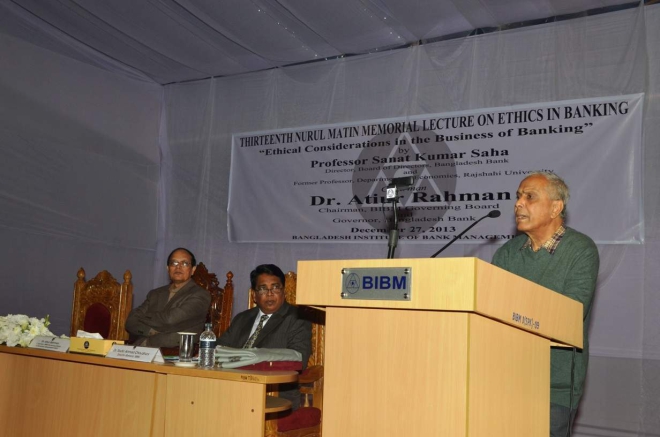Improve ethical standards of banking: Economist

Bankers have to take care of diverse issues to deal with ethical questions in their practices and must work to improve standards, said Sanat Kumar Saha, a director of Bangladesh Bank.
“As we all know, the banks deal in money. The instrument is credit. Deposit accumulation from private beings or social bodies, and, deposit creation through the disbursement of loans from its accumulated account of funds are their basic functions,” Saha said.
“There is a time-tag attached to each deal. The greater the time-scale, the more is the risk or liability which demands to be compensated accordingly. This is how the rate of interest—multiple values for multiple levels in time and quantity—enters into the game and keeps it in motion.”
The development economist spoke at the 13th Nurul Matin Memorial Lecture on ethics in banking, at the BIBM auditorium in the capital on Friday.
The difference between what the bank earns on the loans it creates and what it gives on deposits it accumulates is its profit, Saha said.
“The object of the bank is to maximise it in the given circumstances. So long as it remains transparent and consistent with the laws, as enshrined on the basis of the will of the people that is reflected in a democratic choice there is nothing wrong in it.”
“Interest payments, one way or the other, are prices of risks involved. As a practice, they should not be treated as unfair.”
In order to implement a policy of inclusive growth, the central bank's initiative gives special emphasis on the member banks giving out loans for small- and medium-scale enterprises to the people belonging to the lower strata in the society, particularly in rural areas with women getting special attention in the arrangement, Saha said.
The sharecroppers with little means to provide collateral are also brought under the scheme for productive loans with a provision for recycling them for longer term benefits, he said.
Apparently these do not maximise 'profit' as usually understood, but they are surely in the direction of optimising social benefit, which, no-doubt, contributes to enhancing long-term profit in a broad sense of the term, he said.
"This, to my mind, is an act in the right direction to raise the ethical standards of our banking system."
Fairness in policies and actions become meaningful only if they are allowed to operate in a congenial atmosphere with little to worry about relating to these basic habits in the development of social relationships on a macro-level in the population, he said.
The regulatory authority has, therefore, to work as the watchdog to see that the evils of imperfect competition are contained and the norms of the forward-looking ethical conduct are maintained, Saha said.
Banking operations, even though impeccable on the surface, could be unfair, like in draining out the surplus of the then East Pakistan peasants earned through their exports and using it to build up the industrial base in West Pakistan, he said.
The banking and industrial houses joined the power clique of the state, which cannot be called ethically fair, although it was compliant with all the laws at the time, he said.
Taking a broader view of profit, with the entire society into consideration, the relative good to the less privileged ones as a result of policy initiatives is also counted in the determination of the resultant, he said.
“I feel that ethics and normative behaviour cannot grow in a vacuum. In the workplace, corporate culture plays an important part in indoctrinating an employee to a particular line of thought,” Bangladesh Bank Governor Atiur Rahman said.
A culture of impunity and the absence of the rule of law encourage imprudence and recklessness whereas, a work culture that promotes and sustains honesty and probity reinforced by appropriate incentives and punishment is conducive to the growth of an ethical organisation, he said.
Thus, a good corporate governance system needs to be in place reward the worthy and punish the habitual offender, he said.
“This is the first line of defence against banking malpractices and derelictions of duty.”




Comments